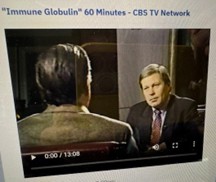How to prepare for a 60 Minutes interview
In January 1998, I started in my new position as head of IPPA, which is now PPTA. I remember when I came, that one of the first things I did was to undergo media training. As a European, as a Dutchman, I had some exposure to media, but nothing compared to what could happen in the USA.
Intense training occurred and turned out to be very necessary. At the end of January, I had my first Board meeting in New York and told the Board that I foresee big issues with the availability of immune globulins. Though the Board realized that there were serious issues that needed to be dealt with, they did not want to burden me with everything and told me to focus on running the Association. That changed quickly.
The number of questions increased about the shortage of immune globulins and various media were knocking on the door. Suddenly 60 Minutes became active and ambushed one of the industry persons at a conference. The Board asked me then to take care of it.

The media training intensified, and many sessions were set up. You must understand, I was 46 years old, a newcomer to the USA, no experience with US media and a strong accent (which I still have).
In one of the sessions, we focused on the question of exports when the plasma was collected in the USA, manufactured in the USA, and needed in the USA. That is where I came up with: “We are all children of the same God.”
In the meanwhile, we had negotiated with the 60 Minutes production team that I would consider going on camera if I had an opportunity for a backgrounder with Mike Wallce for 45 minutes. After that I would decide if I would do it. That is how it went, I spent 45 minutes with Mike Wallace and walked him through the process of collecting and manufacturing.
During the time of the preparation, companies offered help. None of the company PR people knew me, only the Board who had appointed me knew who I was and what my capabilities were.
During a meeting in Laguna Beach, California, one company flew in a camera operator, a soundman, a producer, and an interviewer for extra training. All the PR people of the members were there and asked me what I was going to do. I told them that they could sit in on my training because I had nothing to hide. They were pleased. Just as we were ready to start, I asked all the company people to leave the room. They were surprised because I had allowed them to sit in. I told them that the first recording would be private, however, they could see the result and then stay. This was my way of showing them that I was in charge!

After all training, we were approaching the date of the interview. The Board told me that they would support me when I decided to go on camera, they would also support me when I decided not to go on camera. There was no script that they gave me. They asked me to do whatever I felt needed to be done. That for me is the biggest compliment I have ever received.
After the backgrounder I decided to do the interview. It went well. The biggest challenge is to stay focused when you get the same question repeatedly. If you show any frustration, that is what will be used. Yes, the question about exports came and my answer was sufficient.

A few months later, I was having dinner in New York with an industry leader. Mike Wallace was there with his son Chris. The industry leader did not want to be close to Mike Wallace and used me as a shield.
When I picked up my coat, Mike Wallace saw me and wanted to ask me a question:” How did you feel; we treated you” I told him it was fair and that my interaction with him was pleasant. For many this was a total surprise that he was a friendly man!
Jan M Bult